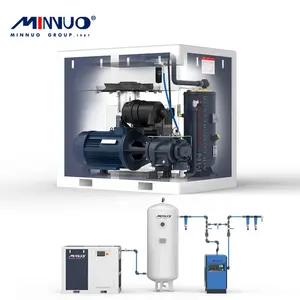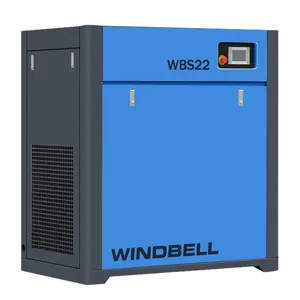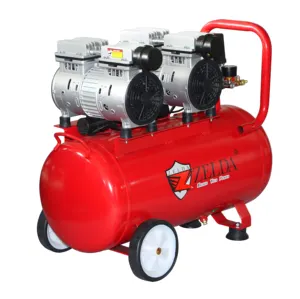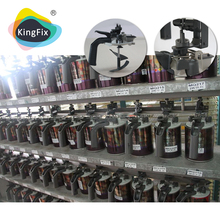Introduction
In the realm of workshops and industries, the debate between traditional oil-lubricated and oil-free air compressors is a hot topic. This article aims to shed light on the benefits of oil-free air compressors, debunking common myths and highlighting their technological advancements. We delve into the key advantages of these compressors, their environmental impact, maintenance and operational costs, quality of compressed air, and safety and health benefits. Furthermore, we provide guidance on choosing the right oil-free air compressor for your workshop and share a case study demonstrating the transformative power of these devices.
Understanding Air Compressors: Traditional vs. Oil-Free
The debate between traditional oil-lubricated and oil-free air compressors is ongoing. For clarity, we're focusing on the most common type encountered daily: reciprocating single-stage piston air compressors. There are myths surrounding both types, such as oil-lubricated compressors lasting longer and oil-free compressors being louder. However, the truth is that oil-free compressors can operate at lower RPM, reducing noise, heat, and friction. They also use heat-dissipating aluminum cylinders to run cooler. In contrast, oil-lubricated compressors may be preferred in extreme heat and humidity due to their ability to dissipate heat quickly and resist rust.
The Technology Behind Oil-Free Air Compressors
Oil-free air compressors either have no mechanical contact inside the compression chamber or use alternate materials for protection without lubrication. They utilize materials like water or a Teflon coating to keep the mechanism running smoothly. The lubrication of bearings and gears is all external to the compression chamber, ensuring no oil contaminates the compressed air. Some oil-free designs have even removed metal-to-metal contact within the compression chamber, eliminating the need for oil-based and synthetic lubrication altogether.
Key Advantages of Oil-Free Air Compressors
Oil-Free Air Compressors offer several advantages over their oil-injected counterparts. They require less oil and less costly oil changes, making them more economical in the long run. They are also ideal for industries with strict cleanliness standards, as they ensure the compressed air supply is free from oil contaminants. This makes them a wise choice for industries such as robotics, food and beverage, automotive, pharmaceutical, textiles, plumbing, and aerospace, where air quality and contaminant levels are crucial.
Environmental Impact
Oil-free air compressors contribute significantly to environmental preservation. They help reduce the use of fossil fuels and maintain the planet’s natural resources. These compressors are less wasteful as they don't require the replacement of air/oil separator and filtration elements, reducing landfill waste. Moreover, oil-free air compressors produce the purest form of air, minimizing negative atmospheric impact. They also eliminate the risk of oil spills during projects, preventing environmental contamination. Lastly, oil-free air compressors require less energy to run, reducing your environmental impact.
Maintenance and Operational Costs
Oil-free air compressors offer significant savings in terms of maintenance and operational costs. Unlike oil-injected compressors, they don't require regular oil changes or air/oil separation and filtration treatments, saving both time and money. Additionally, some oil-free compressors come with energy regulators, using power only when necessary, which can lead to substantial fuel cost savings. Furthermore, their initial cost is often lower, and the reduced maintenance requirements contribute to a lower total cost of ownership.
Quality of Compressed Air
Compressed air quality is crucial in various industrial applications. It's measured by the amount of solid particulates, water, and oil content in one cubic foot of compressed air. The ISO 8573-1:2010 standard, also known as Class 0, requires compressed air to contain less than 0.01 milligram per cubic meter of liquid oil, oil aerosol, or oil vapor. Class 0 certified oil-free air compressors, such as centrifugal and rotary screw compressors, can provide this level of purity, ensuring 100% oil-free air and eliminating risks of contamination.
Safety and Health Benefits
Oil-Free Air Compressors are a wise choice for industries where air quality and contaminant levels are crucial. They ensure the manufactured products are clean and safe as there's no oil in the compressed air supply. This is particularly important in industries with sensitive applications that need to meet strict government standards and requirements. Industries that could benefit from an Oil-Free Air Compressor include Robotics, Food and Beverage, Automotive, Pharmaceutical, Textiles, Plumbing, and Aerospace.
How to Choose the Right Oil-Free Air Compressor for Your Workshop
Choosing the right oil-free air compressor involves understanding different technologies and their applications. The selection should satisfy discharge pressure and delivered air flow capacity requirements. Baseline performance data is crucial in determining sizing, selection, and capacity control strategies, which ultimately impact energy consumption. Additionally, the choice of motor for the compressor is vital. Considerations include fixed or variable speed, winding and bearing temperature, voltage tolerances, efficiency levels, starting methods, and starting characteristics.
Case Studies: Workshops Revolutionized by Oil-Free Air Compressors
A renowned manufacturer of compressed air systems has been instrumental in transforming struggling auto shops. By providing a reliable source of clean, dry air, essential for efficient operations, they have made a significant impact. Their air system specialist tailors the system design to the specific needs of the shop, often opting for compact and efficient models due to their compactness and efficiency. They also help overhaul outdated air distribution systems with their modular, aluminum piping system. This case study exemplifies how the right air compressor system can significantly improve operations and potentially extend tool life.
Conclusion
Oil-free air compressors have revolutionized workshops and industries, offering numerous advantages over traditional oil-lubricated counterparts. They are not only more economical and environmentally friendly, but they also provide superior air quality, crucial for many industries. Their lower maintenance and operational costs, coupled with their ability to meet strict cleanliness standards, make them an ideal choice for a wide range of applications. Choosing the right oil-free air compressor requires a thorough understanding of different technologies and their applications. The case study of a renowned manufacturer's transformative work in auto shops illustrates the transformative potential of these devices. In conclusion, oil-free air compressors are a wise investment for any workshop, offering a multitude of benefits that can significantly improve operations and extend tool life.

















































 浙公网安备 33010002000092号
浙公网安备 33010002000092号 浙B2-20120091-4
浙B2-20120091-4